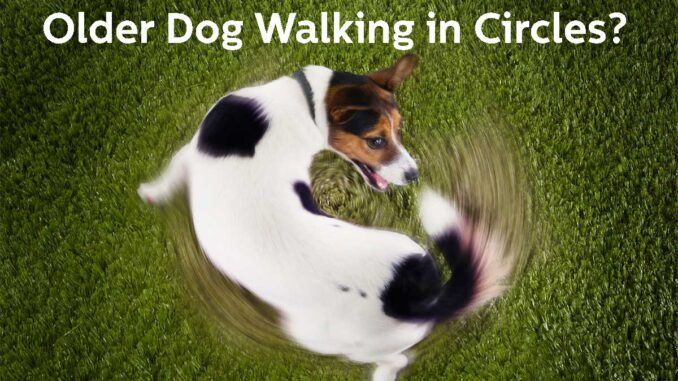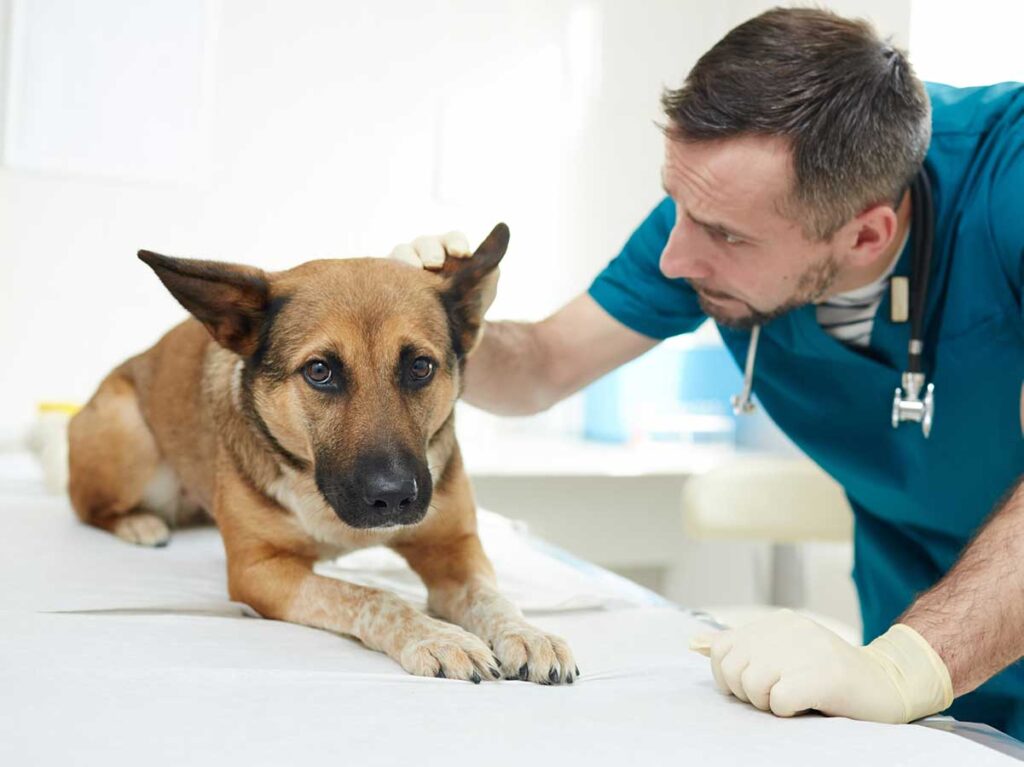
This article was updated on November 30th, 2023

Puppies may have a habit of running around in circles chasing their tails, but when a senior dog starts walking in circles, it’s usually a sign that something is wrong. In this article, our veterinary team shares the most common reasons older dogs start walking around in circles, and shares what to do to help.
Key highlights:
– Spinning in circles could point to an issue with your dog’s ears or brain
– Inner ear infections, vestibular disease, anxiety, and canine cognitive dysfunction are all possible reasons your dog may be walking in circles
– If your dog only spins in circles before food time or when excited, it’s not much to worry about.
– Call the vet if they seem uncomfortable and are doing it frequently every day
Why is my dog walking in circles? 4 things to know

1. If your dog is frequently spinning in circles everyday, it could be very serious
“It is completely possible that your old dog is spinning in circles just because he wants to. This is especially likely if your dog spins in circles before defecating or lying down and shows no compulsion or other medical symptoms. Dogs also circle when investigating. This is usually accompanied by sniffing and is nothing to worry about.”
“However, if your senior dog spins frequently every day, it could be because of a serious health issue that needs veterinary treatment. Some of these causes could be as serious as a tumor, so it’s important to get your dog checked out at the vet soon.”
While spinning in circles before lying down is considered normal for dogs, you should definitely be worried if your old dog walks in circles for several minutes at length or excessively repeats the behavior. The good news is that your vet will probably be able to help with most of these issues.
Let’s now review the most likely reasons.
2. From ear infection to anxiety, here are the top 6 reasons senior dogs start walking in circles
“So why do dogs spin in circles? There are multiple answers to this question, but circling usually means something is not quite right with your dog’s ears or brain.”
Some reasons for a dog walking in circles can be:
1. Vestibular disease can affect balance
Old dogs are particularly prone to vestibular disease, which affects the inner ear and balance.
Symptoms: If your old dog has vestibular disease, they will repeatedly fall, excessively drool, walk with their head down, walk in circles and/or experience flickering of their eyeballs from side to side. They may be nauseous. In fact, vestibular disease is often described as being like a stroke.
Is it serious: Although it can be frightening, most dogs recover from vestibular disease on their own in a matter of days. Some dogs can deteriorate, though, especially if they’re too nauseous to eat.
You’ll need to carry them out to the toilet, make a sling to help them walk, or resign yourself to regularly changing the bedding if they can’t get up. Offer them water, and small amounts of tasty food wherever possible—but don’t be surprised if they don’t eat. However, if your dog’s stumbling is severe, you can’t do this care at home, or they haven’t shown any improvement in 48 hours, he may need to be hospitalized and given intravenous fluids to prevent dehydration.
Learn more about vestibular disease in senior dogs.
2. If your dog is repeatedly shaking their head, it could be an inner ear infection
One reason for your senior dog walking in circles can be an inner ear infection.
Symptoms: If your dog walks in circles and seems disoriented, it might be due to an ear infection. Other symptoms include odor from the ears, itchiness, redness, an inability to focus eyes in one place, and repeated shaking of the head.
Is it serious: If the infection has already started affecting your dog’s behavior, then it is serious and needs immediate treatment.
“An inner ear infection is a deep infection, past the eardrum and close to the brain. If the eardrum is intact, topical medication won’t get deep enough. Even in cases with a ruptured eardrum, ear drops are unlikely to penetrate far enough. It’s likely your dog will need to go on oral antibiotics. Contact your vet ASAP so your dog can start on antibiotics as soon as possible.” Learn more about ear infections and treatments.
3. Behavioral disorders like obsessive-compulsive disorder
Dogs are prone to behavioral disorders like humans, which can also be the cause of their circling. For example, obsessive-compulsive disorders can compel your dog to repeatedly circle a spot before completing an activity.
Symptoms: In case of a behavioral disorder, your dog will not have any medical symptoms but might exhibit other strange repetitive behaviors.
How to treat: Keep your dog away from any triggers and make sure they’re getting sufficient mental and physical exercise.
Learn more about old dog behaviors and disorders.
4. Canine cognitive dysfunction (CCD) can impair motor function
A slow decline in the cognitive function of dogs as they get older is known as canine cognitive dysfunction or “doggy dementia.” It results in loss of memory, learned behavior, and motor function.
Symptoms: A dog suffering from CCD will be disoriented, sluggish, irritable, and more prone to house soiling. They may also undergo sleep changes.
Is it serious: It is a progressive disease that, unfortunately, cannot be cured and gets more serious with time. Proper management is the key to maintaining the quality of life.
How to treat: Luckily, the symptoms of CCD can be managed with a consistent routine, dietary supplements, and regular mental and physical stimulation. Feed your dog food rich in antioxidants and omega-3 fatty acids to help alleviate symptoms.
Learn more about Canine Cognitive Dysfunction / Old Dog Syndrome.
5. Neurological disease
Neurological disorders and other brain ailments like head injuries and tumors can also lead to circling behavior in dogs. Old dog neurological disorders include seizures, spinal diseases, intervertebral disc degeneration, etc.
Symptoms: An old dog might be spinning in circles due to a neurological disorder. Symptoms include fever, pain, skin changes, diarrhea, and a lack of appetite. Dogs with neurological problems are also unlikely to be able to stop or redirect their circling when distracted.
Is it serious: Neurological disorders are quite serious but can often be cured with proper medical care.
How to treat: Take your dog to the vet and support it with supplementation. Omega-3 fatty acids, turmeric, and MCT oil are excellent supplements for dogs with neurological problems, but you should check with your vet before using them, as these can interact with some commonly-used medications.
6. Pain or Anxiety
If nothing has resonated thus far, the answer could be pain or anxiety. Pain can also lead to anxiety which can become especially bad if your dog is the anxious type.
How to diagnose: An old dog walking in circles and panting is likely to be anxious or in pain. Other signs of pain and anxiety are aggression, excessive barking, house soiling, agitation, growling, hiding, and shallow breathing.
Is it serious: Pain is a sign that something is wrong with the body, so your dog’s condition could either be serious or nothing to worry about, depending on the cause of the pain.
How to treat: Let the vet determine the source of the pain and anxiety and begin proper treatment. Learn more about senior dog anxiety or senior dog pain relief.
3. The sooner a diagnosis, the better
While there’s a possibility that it’s nothing serious, a visit to the vet is always recommended. Reasons for the spinning could include stress, ear infection, vestibular syndrome, behavioral disorder, canine cognitive dysfunction, or neurological disease. The sooner the diagnosis is made, the sooner the treatment will begin, and your dog can return to peacefully enjoying their day.
4. Some (milder) cases can be helped with exercise, stress relief, and diet changes
If you’re still wondering how to stop a dog from spinning in circles, here are some things that can help if it’s a mild case. However, still contact your vet if your dog is frequently spin in circles every day.
- Exercise. If your old dog has no underlying medical conditions, then he could be circling due to pent-up energy. Give him longer walks and more active playtime to help reduce the behavior. Learn about exercising old dogs safely.
- Eliminate stressors. Certain environmental stressors can also lead to circling in anxious dogs. For example, he could be spinning in circles due to loud sounds. Eliminate these stressors to put an end to the circling behavior. Learn more about senior dog anxiety.
- Dietary changes. Your old dog could be spinning in circles due to dietary issues. Consult your vet for dietary changes to help reduce this type of circling. Learn about senior dog nutrition.
Keep in mind that most conditions causing dogs to walk around in circles need veterinary treatment. While the tips above may help in some cases, please make sure that you do not delay your visit to the vet.
Disclaimer: This website's content is not a substitute for veterinary care. Always consult with your veterinarian for healthcare decisions. Read More.



Our ten year old rescued jack russell spins when he needs to relieve himself. He is very predictable.